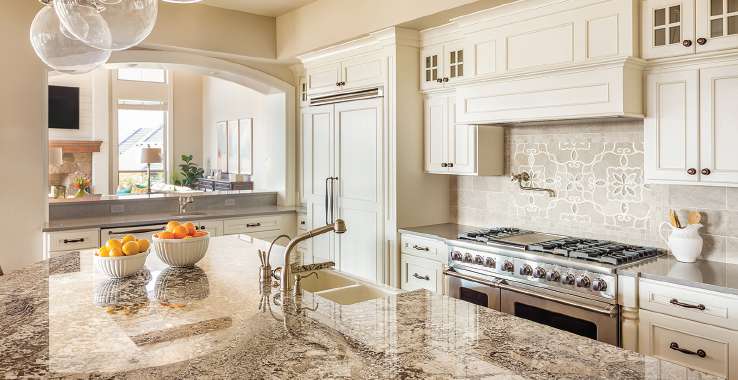The kitchen tends to be the home’s gathering place, so it’s only natural you want it to look and feel welcoming. But as the hub of your home, your kitchen needs durable countertops, especially if you have little ones helping with the cooking.
Quartz countertops are a trendy choice for kitchens, but before you get in touch with your contractor, it’s important to assess the pros and cons and review some alternatives.
Pros of quartz kitchen countertops
• Durable Quartz countertops are highly durable, made from a mix of stones and stone-like materials bound together with resins. Makers of quartz countertops press the materials and resin into slabs that are solid and nonporous. That means the counters won’t chip or crack with everyday use (like when your little ones are helping you cook).
• Stain-resistant Quartz is highly stain-resistant, thanks to its nonporous surface. But it can be stained by certain substances — like red wine, coffee, tea, tomato sauce and juice — if the spill isn’t cleaned up immediately. The staining happens when the liquid interacts with the resin.
You’ll also want to use gentle cleaners instead of harsh chemicals. Another positive: Quartz is relatively low maintenance and doesn’t require sealing.
• Highly customizable Thanks to advances in engineered quartz, you can choose from a variety of patterns that can be custom-made or mirror the look of granite or marble.
Cons of quartz countertops
• Pricey The price of quartz is high compared to the price of materials like marble and limestone. On average, quartz kitchen countertops cost $70 to $80 per square foot with installation.
• Prone to heat damage While quartz is heat-resistant, the binders used in about 10% of a quartz countertop slab are not. So, leaving hot cookware directly on a quartz counter could cause unsightly stains.
• Requires professional installation Installing quartz countertops is probably not a DIY task. The material is incredibly heavy and needs professional attention to ensure the kitchen can support the counters.
What should you look for in a quartz countertop?
Look for the following quality markers when buying a quartz countertop.
• Cohesive colouring Compare separate slabs from the quartz you plan to buy. Are they the same colour?
• Colouring through the surface Make sure the veins and colourations you see on the surface of the quartz continue throughout the slab.
• Consistent aggregates Aggregates are the pebbles you find along the edges of your countertops. No matter the size of these pebbles, they should be consistent throughout the countertop.
Alternatives to quartz countertops
Your kitchen countertops should fit your lifestyle and the look of your space. So, before you choose them, explore several options to see what works best. Some alternatives to quartz kitchen countertops include:
• Marble Marble is often comparable in price to quartz, but it has a unique and elegant look that may make the price worth it for some. While neither quartz nor marble requires resealing, marble has a porous surface, so it may be susceptible to stains, especially from acidic liquids, like tomato sauce or lemon juice. Quartz isn’t porous like marble but can still stain, too.
• Slate Slate is just as durable as quartz, but its designs and aggregates are more uniform. Slate costs more than quartz on average and requires a decent amount of maintenance, including regular sealing.
• Granite Granite countertops are naturally made versus the man-made designs of quartz. While prices may be similar, granite requires more maintenance because of the need for regular resealing.
How much do quartz counters cost?
There are many factors that influence price, including the material’s thickness, edging, cuts, angles and the number of slabs required. The cost will also vary depending on the material’s finish, from honed to polished to leathered, according to HGTV.
The average price for supply, fabrication and installation is $70 to $80 per square foot for most quartz and granite.
The average cost of supply for a natural stone or quartz countertop is $25 per square foot, while expensive and covetable materials like marble typically cost $30 per square foot and higher.
More affordable materials, such as basic granite, typically cost around $15 per square foot.
What should you ask your contractor about installing quartz countertops?
Before you hire a pro to install new counters, be sure to ask a few questions, including:
• Is your team experienced with installing quartz countertops?
• Will replacing my kitchen countertops require a permit?
• How much do you charge for countertop installation, including removing my old countertops?
• Will you move my appliances and fixtures during installation, or am I responsible for that?
• Do you have insurance that covers any damage to my home or countertops during installation?
• Do you offer a warranty if something happens to the counters after installation?
The answers to these questions and the information above can guide you as you decide whether quartz countertops are the best option for your kitchen.
Always remember, when you’re thinking of renovating your home or having a brand new home custom built just for you, a REALTOR® can help you make an informed decision about what type of materials will give you the best return on your investment whenever you decide to sell in the future..
— Houselogic.com



